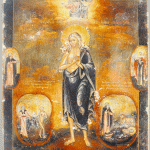
We are to be good neighbors, helping each other with each other’s needs. This is true, not only in relation to material needs, such as food (often represented in Scripture as bread), but also for spiritual needs, which St. Antony the Great also represented as bread:
Abba Antony said, ‘A person went to his neighbour in the Gospel in the middle of the night and said to him, “Loan me three loaves of bread because a friend of mine on a journey has come to visit me” [Lk 11:5]. The three loaves of bread that the man gave his neighbour are the three practices of hospitality, hunger, and need. Repentance has knocked, seeking compassionate giving, as though it knew that these things guide the person who does the will of God.’[1]
This saying was, to be sure, written down for a monastic audience, which is why we find in it an emphasis on ascetic disciplines (fasting and detachment). Nonetheless, it gives us an important message as it showed us that Antony understood that monks should also practice hospitality when engaging their personal spiritual disciplines. Being charitable towards others is just as important as following a proper spiritual regiment, indeed, it could be said to be more important, as love, which hospitality engages, is the most important virtue, for through it, one will be able to build upon and develop all other virtues. Hospitality, therefore, was used here to help remind monks that engaging it, even when one has to go against their normal routine to put it in practice, is not only important, but its pursuit will help strengthen and reinforce the spiritual development their discipline provides to them.
The point of any ascetic discipline should be to develop one’s character, indeed, to develop one which reflects God’s loving and charitable goodness. Just as Jesus fulfilled the law and prophets by embracing the fullness of love and its dictates, monks fulfilled their calling, and all their regulations, only if they followed the expectations of love. Without it, their discipline could lead them to pride and vainglory. But with love, they could embrace the humility which is needed for their disciplines to be effective. This is why, when they embraced someone with the spirit of hospitality, even if it meant they had to go against the letter of some monastic regulation, they were seen as fulfilling those regulations.
Similarly, as the spirit of monasticism is that of humble repentance, monks, even when they did not have someone come to them, asking for hospitality, had the spirit of repentance knocking at the door of their heart, having them know that they should discipline themselves so that they can embrace the way of charity. That when, when someone came to their cell, they would be ready to help them.
In this way, while the story which Antony told could be and read on a simple level, that is, as a monk who properly welcomed their neighbor, giving them the bread they needed, it is clear there was a higher meaning to the story, one which Antony also used to explain what he meant. He wanted the story to be seen as a parable explaining how monks should always welcome the spirit of repentance, the spirit which is always knocking at the door of their heart, giving it what it needs, and if and when they do that, they will find themselves directed to do what God wants them to do.
We, of course, can also learn from this story. While we are not ascetics, engaging rigorous discipline, we are called to embrace charity, to be hospitable towards others, even when it might be inconvenient (but not impossible) to provide others what they need. Jesus was often “inconvenienced” by those who came to him looking for his help, and instead of dismissing them, telling them he was out to do something else, he took the time needed to help them before continuing on what he had been doing. But, unlike Jesus, we have found ourselves constantly going astray. We need to open up to the spirit of repentance when it comes knocking at the door of our heart, and we, too, need to find a way to embrace it, casting aside our own selfishness, so that we can find ourselves open to the will of God in our lives. This is why Jesus told us to take up our cross and follow him: we need to out our selfishness, our egotism, upon the cross so that it can be brought to Christ and through him come to an end. Then, after it is gone, we will find ourselves living for God and doing what we should do.
Thus, repentance is not only about stopping what we have done wrong, though it certainly is a part of it; it is about healing the pain and suffering we have cause others, and also ourselves, as a result of our wayward actions. Love is the key because it makes sure our repentance is true. Those things which would get in the way of our love, including getting in the way of properly loving ourselves, need to be cast aside, and if that means we must embrace some personal discipline, like fasting, to help get that started, perhaps we should consider doing so (as long as we do so in the right spirit, and not confuse the discipline with our goal). Then, we will find ourselves open to the God who is love, and the more we are open to God and God’s love, the more loving we will become, revealing, in the end, that we are truly children of God due to the way we love.
[1] More Sayings of the Desert Fathers. An English Translation And Notes. Ed. John Wortley (Cambridge: Cambridge University Press, 2019; repr. 2023), 143 [“Sayings Preserved in Coptic”: C62].
Stay in touch! Like A Little Bit of Nothing on Facebook.
If you liked what you read, please consider sharing it with your friends and family!
N.B.: While I read comments to moderate them, I rarely respond to them. If I don’t respond to your comment directly, don’t assume I am unthankful for it. I appreciate it. But I want readers to feel free to ask questions, and hopefully, dialogue with each other. I have shared what I wanted to say, though some responses will get a brief reply by me, or, if I find it interesting and something I can engage fully, as the foundation for another post. I have had many posts inspired or improved upon thanks to my readers.













